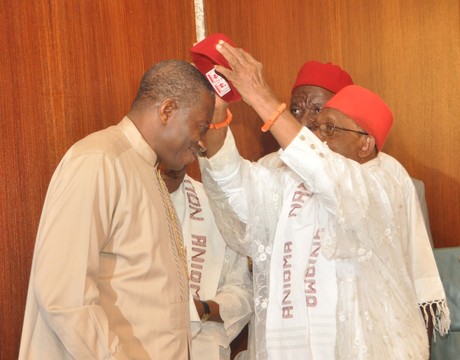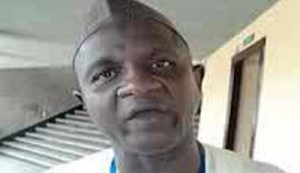We’ll exit club of under-developed nations by 2018 – Nwankwo, DMO boss
By Amechi Ogbonna
Director General of Debt Management Office (DMO), Dr. Abraham
Nwankwo, recently spoke on efforts by the Federal Government, through
his office, to create a virile bond and securities market that would
ease the funding constraints of the three tiers of government and the
private sector.
He explained that the economic transformation programme of President
Goodluck Jonathan had further bolstered the global business community’s
confidence in Nigeria’s economy. Nwankwo believes that government’s
rising reform profile has also been responsible for the overwhelming
patronage of its sovereign bonds sold in recent times.
Commenting on why international investors subscribed to Federal
Government’s $1 billion Eurobond sold a couple of months ago, Nwankwo
stated that investors were excited at Nigeria’s transformation agenda,
her agricultural revolution, power sector reform and infrastructure
transformation going on in several sectors of the economy. Other factors
that may have attracted them, according to the DMO boss, include the
dramatic changes in the aviation sector, job creation initiatives,
institutional building, reforms in transportation and railways as well
as administration’s new philosophy of transparent structures being
created for the management of public finance at all tiers of government.
“They came to the conclusion that the economy is doing well and that
it would continue to grow in the next five years,” Nwankwo stated.
Excerpts:
How we sold $1.0bn Eurobond to international community
The job was done by Nigerians, investors looked at the
fact that the transformation agenda of President Goodluck Jonathan is on
course. They looked at various components of the various sectors of the
economy and saw what the government is doing in agriculture and the
fact that the distribution of fertilizer, seedlings and other inputs had
been rationalised and made very efficient and are reaching the real
farmers.
There is also the fact that the power sector has been
successfully privatised and we are at the threshold of private sector
power-led initiative that will ensure adequate and stable supply of
electricity. They looked at the infrastructure transformation going on,
especially on roads, and the fact that the railway lines have been
revitalised and some lines have started operating and more are underway
to be reactivated. They also saw the dramatic changes that have taken
place in the aviation sector and with our airports.
They looked at the fact that in terms of institution
building, a lot has happened. For example, in public debt management in
Nigeria, efforts have been made over the couple of years to ensure that
not only the Federal Government but every state of the federation has a
functional debt management department.
When they look at all these as part and parcel of the
transformation agenda of President Goodluck Jonathan, they came to the
conclusion that the Nigerian economy is doing well and that it is on the
right part and if we continue the way we are going. There is no doubt
that in the next five to seven years, Nigeria would have arrived at a
stage where it would be so obvious to everybody that we have left the
group of underdeveloped countries and more importantly, they are looking
at the various measures government is taking to ensure that the growth
process is inclusive, that in the process of growth even though we have
been registering very credible growth rates in the world over the past
five or more years, the current efforts being made by government to
ensure that the growth process is inclusive, like I said earlier, is
generating employment and reducing poverty.
These are the things that private investors all over the
world are taking into account. Of course, when we went to sell the bond
under the leadership of Dr. Ngozi Okonjo-Iweala, the Coordinating
Minister of the Economy and Minister of Finance, we told the Nigerian
story as forcefully and as factual as we could; all aspects of the
Nigerian economy, including politics, agriculture, banking,
infrastructure, human resources and media. We told all the stories about
Nigeria effectively with facts and figures and it was obvious to
international investors that Nigeria is on the right path. Essentially,
we are crossing the threshold and that Nigeria, given her potentials,
has eventually come to terms and we have taken advantage of those
potentials, transforming them so that they will lead to welfare for the
generality of the Nigerian people.
Flexible market instruments as part of medium term strategy
I want to assure Nigerians that some of the products
are already coming in the near time, while some will be in the medium
term. For example, the Global Depository Note we talked about, which is a
way of encouraging special classes of international investors who would
not invest directly in the domestic bond market except through a
depository arrangement, is likely to come on stream this year subject to
approval by the National Assembly.
The inflation-linked bond, we are working on it and we
believe in the near time, it will come to fruition. The other
flexibility arrangements we talked about, including the securities
lending, certainly will come on stream before the end of the first half
of 2014. So many of these measures coupled with the concrete new
products as well as the flexibility instruments, are coming in the near
to medium term, I can assure you.
Foreign investors holding FGN securities
We are used to emphasising statistics that our public
debt is so much and that is why we focus on talking about what are the
benefits to the Nigerian economy, particularly the private sector that
derives from these beautiful statistics we talk about.
So is it good enough to tell Nigerians our debt is so
much? We have spent some time explaining to financial journalists the
implications of those statistics. What are the opportunities in real
terms embedded in them that will translate to good standard of living
for our people and that’s why our emphasis is on pointing out the
opportunities we have created for the private sector so that they will
issue their own debt instruments in the markets.
We have developed so that they can raise long-term money
to invest in the real sector of the economy, in infrastructure. By so
doing, they will create jobs for our teeming population and it will lead
to more income in the society because for every Nigerian who earns
income by being gainfully employed, you know that there are many other
dependants relying on that person, so there will be spread in welfare
and reduction in poverty.
Federal Government’s total debts
Our focus now is not talking about figures. Yes, let me
say in summary that our debts as usual remain sustainable and the
statistics are there but it’s not an issue of statistics. Over the past
seven years, we are one of the least borrowed countries in the world in
terms of statistics. However, government has continued to emphasise from
the public debt management point of view that yes, our debt is
sustainable.
All of us should appreciate there is the need for us to
diversify our economy because we are overly dependent on oil revenue for
driving our economy as a source of foreign exchange and revenue for
government. But I strongly believe there is need to diversify that. So,
the focus of everyone of us is how to diversify the sources of revenue
for government. If we do this, we will observe that beyond the
statistics, our debt will even be more sustainable instead of depending
on oil and gas for about 80 per cent.
For instance, it will be good if we are dependent on oil
and gas for about 30 per cent, while we also depend on revenue from
agriculture. Yes, agriculture is the biggest sector of Nigeria’s economy
but it is high time we operated it in such a way that many of our
farmers would be more productive and competitive and would be exporting
their products, including processed goods and as they export them,
government earns income in terms of duties, while the farmer also earns
more income. In that way, our economy will be diversified both for the
private sector and as a source of revenue for government and our debt
will therefore be more sustainable. Today, our debt to GDP ratio is
still below 21 per cent and it is quite sustainable.
Now, in terms of participation of foreign investors: in
the wake of the global financial meltdown and because of Ben Bernanke,
chairman of the Federal Reserve, the Central Bank of the United States’
statement that quantitative easing was going to taper because there is a
belief that the US economy is getting better, investors all over the
world started recalling their investments wherever they were in
anticipation of higher yields so they could also diversify their
investments into the US economy to take advantage of it.
So you could expect that the level we achieved in 2012
has come down to anything around five and seven percent but certainly we
are not in a position to stabilise yet. All over the world, if you
listen to the financial market news from the CNBC or Bloomberg, you will
appreciate that recently, the additional reports coming from the UK
show that their economy is getting better to the extent that there was a
huge drop in the unemployment figure, which is positive for the US
economy.
The fact that it is positive for the US economy means
that for investors, there is a higher prospect that they can earn more
by investing their money in the US economy. Therefore, it’s a time for
them to wait a little longer, hold their money and take advantage of the
positive development in that economy.
The global economy in respect of that stimulus from the
US economy in terms of possibility of the quantitative easing being
drastically reduced, that intermediate period is still on and I guess it
will take us up to the next two or three months to be able to settle at
the new level.
IMF raising Nigeria’s borrowing threshold
The International Monetary Fund (IMF) didn’t raise
Nigeria’s borrowing threshold, maybe indirectly. Countries are
classified in various groups, so Nigeria belongs to a particular
category and because of change in Nigeria’s per capita income, she has
changed categories and the one in which we belong to now is allowed
technically to borrow up to 56 per cent of our debt GDP ratio without
raising eyebrow in terms of credit worthiness just as it’s much higher
in developed countries.
So, it’s an appreciation from the point of view of those
global financial institutions that Nigerian economy is moving to the
next level and in doing so, it has been reclassified in terms of its
capacity to borrow. However, President Goodluck Jonathan, the
Coordinating Mminister of the Economy and the DMO have made it clear
that despite the technical space created, Nigeria would continue to be
conservative in its borrowing as if nothing had happened in terms of
more space for it. So, we will continue to be prudent and continue
borrowing as if it’s using the old limits because the emphasis is not
for government to do more borrowing but to create space for the private
sector to do the borrowing and that is why the theme of our interaction
was on the opportunities created for the private sector from debt
management achievements so they are now being encouraged based on the
benchmark created in the international capital market. Based on the
benchmark and market we have developed locally, the private sector is
now being challenged to take advantage and be the borrowers to invest in
agriculture, solid mineral, infrastructure and so on.
Diversification of investible instruments and customer base
Government is already working on alternative financing
sources and generally the non-interest financing products, including the
Sukuk. Just recently, there was a workshop in Abuja organised by the
Africa Development Bank (ADB), which involved other African countries
and we deliberated on how to go forward, such that Nigeria would be
seriously working on establishing the necessary frameworks for tapping
into alternative sources of funding, including Sukuk.
Nigeria is going to take advantage of all available and
appropriate sources. At the Abuja forum, I did say that it should not be
taken that developing alternative financing should be restricted to
government just as in the conventional debt instruments whereby we are
encouraging the private sector to take advantage. We are also for the
non-interest financing, including Sukuk. While encouraging the private
sector to play the lead role, it’s not for government to start issuing
sovereign Sukuks. At the appropriate time, they will do that but the
private sector should understand this new financing alternative so they
could take advantage of it.
Credit enhancement for Nigerian corporates
There are various credit enhancements that are already
in place for Nigerian corporates. For instance, the partial risk
guarantee offered by the World Bank Group and this usually comes through
the Ministry of Finance. I’m aware there are a couple of projects
seeking funding through this alternative.
There are arrangements in place if some foreign
investors, possibly in collaboration with Nigerian partners, want to
invest in the country and they need some form of political guaranty that
can be assessed from the Multilateral Investment Guarantee Agency (MIGA), a member of the World Bank Group.
Let me also mention that something related to that is
the fact that the Minister of Finance has made known on a number of
occasions that before the year ends, government would have established
the mortgage liquidity facility, which is to help the private sector to
be able to fund mortgages. These are some of the credit enhancement
schemes in various forms.
The Collaterised Mortgage Obligation (CMO) has made it
clear on many occasions that government has obtained $300 million from
the World Bank as a mortgage liquidity facility and that is being
finalised before the end of the year. So there is a lot the government
is doing to ensure it provides the necessary support for the private
sector to overcome some of the structural constraints it has.
Nigeria’s N10.8trn 2012 revenue
Everything happens on yearly basis and in 2013, I have
raised $1.0 billion from Eurobond. Like I said earlier, the government
is going to use the money in providing infrastructure. We are developing
a framework to ensure there is accountability as we disburse the funds
and status update will be given on work done so far.
Whenever local or foreign critics, no matter how highly
placed, want to divert Nigeria’s attention from moving in the right
direction, they begin to criticise. We are saying yes Nigeria has always
had a number of deficiencies and defects, that’s true. For instance,
questions were put to me when I made a presentation about the power
sector; everybody knows that our power sector has not done well over the
past three or four decades.
Is there anybody who has a better idea as a solution
than what the government is currently doing as regards the power sector
reform? But if we know that for having privatised the Power Holding
Company of Nigeria (PHCN), is it the right approach to solving the power
problem?
Government has established the National Electricity
Regulatory Commission (NERC) to set up a price structure that covers
returns to all the value chains because if we don’t do this, we will run
into problems. You have to take into account from generation,
transmission and distribution and find out what would be spent at the
end of the day by the man who consumes electricity? Is it enough to
ensure the return on investment for investors in the sector. Otherwise,
people would not invest and consumers would continue to complain.
Boosting private sector participation in bond market
It’s not the responsibility of government to force
private sector operators who are always in search of profit. Now, what
government has done is to provide that bigger framework, especially the
infrastructure. Government has done the best thing it can for the
private sector as far as the bond market is concerned. It has used the
opportunity of the fact that just like any another government, it would
need to borrow money from the market to fund its fiscal deficit, which
is what every government does.
The government is subjecting itself to the discipline of
the capital market, borrowing from the capital market. The government
didn’t simply go to borrow from the capital market, it made sure that
it’s structured in such a way that it borrowed from the capital market.
It developed the market for a long time fund for the private sector so
that’s the best the government can do in that respect and it has done
so.
Government knows that it also needs to establish a
benchmark for the private sector and it has done that successfully,
making sure that it succeeds in raising funds at competent coupons, to
ensure that when the Nigerian companies go to raise their benchmark on
the sovereign bond. Go and look at other countries that have issued bond
since we issued ours and what their own coupons are, compared to ours.
So, government has done its best as far as debt market
is concerned. It’s permanently working with the private sector to ensure
its various concerns are addressed whether in terms of tariffs, duties
or infrastructure. But even as the private sector makes proposals to the
government on how to get appropriate infrastructure, it should also be
encouraged not to abdicate its own duty because in every economy, we
have three agents, the household, the firms (private sector) and the
government that can work on its own while interacting with others.
Go and monitor all the countries in the world over the
past 10 years, there are few countries that have achieved the type of
macro-economic stability that Nigeria has achieved and that’s one of the
major things our private sector requires, a stable macro-economic
environment and I’m sure if you conduct a research of countries in the
world that have achieved high level of macro-economic stability, Nigeria
is among the first 20.
Also, among the emerging market economies, Nigeria is on
the top five list. These achievements were as a result of government’s
deliberate policies in terms of monetary, fiscal, public debt
management, exchange rate and banking policies. These are some of the
things that government has done to ensure the economy is relatively
stable which also means that if government has not been performing
optimally as it has done in the last two or three years, we will not
have been doing as well as we are doing now.




















